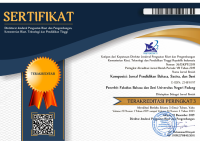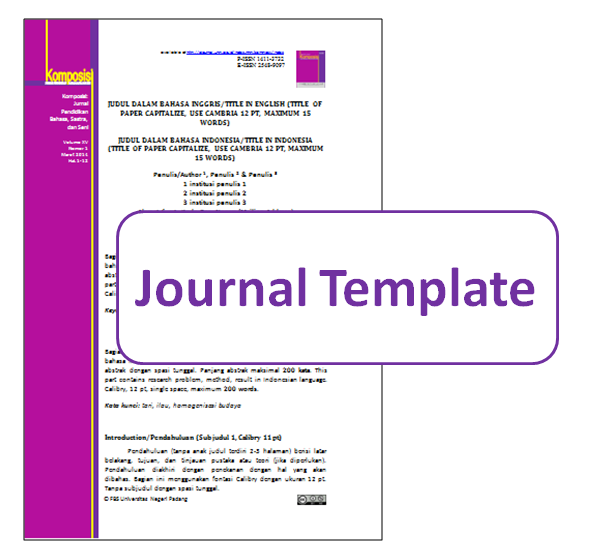Vocabulary Learning Strategies in DOTA 2: A Case Study of Players' Viewpoints
 ), Slamet Setiawan(2), Ahmad Munir(3),
), Slamet Setiawan(2), Ahmad Munir(3), (1) Universitas Negeri Surabaya
(2) Universitas Negeri Surabaya
(3) Universitas Negeri Surabaya
 Corresponding Author
Corresponding Author
Copyright (c) 2025 Komposisi: Jurnal Pendidikan Bahasa, Sastra, dan Seni
DOI : https://doi.org/10.24036/komposisi.v26i1.128079
Full Text:
 Language : en
Language : en
Abstract
Keywords
References
Akhmedov, K., & Phan, A. H. (2021). Machine learning models for DOTA 2 outcomes prediction. ArXiv, 1–11. http://arxiv.org/abs/2106.01782
Al-Khresheh, M. H., & Al-Ruwaili, S. F. (2020). An Exploratory Study into Vocabulary Learning Strategies Used by Saudi EFL learners. Journal of History Culture and Art Research, 9(2), 288. https://doi.org/10.7596/taksad.v9i2.2616
Alahmadi, A., & Foltz, A. (2020). Effects of Language Skills and Strategy Use on Vocabulary Learning Through Lexical Translation and Inferencing. Journal of Psycholinguistic Research, 49(6), 975–991. https://doi.org/10.1007/s10936-020-09720-9
Aravind, B. R., &Rajasekaran, V. (2018). A Study on Vocabulary Learning Strategies of Research Scholars. International Journal of Research, 9(2), 16–25. http://www.eab.org.trhttp//ijrte.eab.org.tr
Ary, D., Jacobs, L. C., Sorensen, C., & Walker, D. A. (2014). Introduction to Research in Education (9th ed.). Cengage Learning.
Camacho Vásquez, G., &Ovalle, J. C. (2019). Video Games: Their Influence on English as a Foreign Language Vocabulary Acquisition. GIST – Education and Learning Research Journal, 19(19), 172–192. https://doi.org/10.26817/16925777.707
Demediuk, S., York, P., Drachen, A., Walker, J. A., & Block, F. (2019). Role identification for accurate analysis in dota 2. Proceedings of the 15th AAAI Conference on Artificial Intelligence and Interactive
Digital Entertainment, AIIDE 2019, 130–138. https://doi.org/10.1609/aiide.v15i1.5235
Diaz, I. (2015). Training in Metacognitive Strategies for Students’ Vocabulary Improvement by Using Learning Journals. PROFILE Issues in Teachers’ Professional Development, 17(1), 87–102. https://doi.org/10.15446/profile.v17n1.41632
Emre, B., Güllep, B., Şenel, G. H., &Kaban, A. L. (2022). Investigation of video game players’ informal learning experiences and their influence on learning english as a foreign language. Handbook of Research on Teacher and Student Perspectives on the Digital Turn in Education, April, 190–212. https://doi.org/10.4018/978-1-6684-4446-7.ch010
Gazam, A., Perkasa, D., Lubis, N., Putri, R. F., & Amin, T. S. (2022). Tertiary Students’ Perception of Mobile Legend Game on Vocabulary Mastery. Indonesian Journal of ELT and Applied Linguistics (IJEAL), 1(2), 2809–557. https://jurnal-lp2m.umnaw.ac.id/index.php/IJEAL
Ghalebi, R., Sadighi, F., &Bagheri, M. S. (2021). A study of vocabulary learning strategies among high and low Iranian English vocabulary learners. Cogent Education, 8(1). https://doi.org/10.1080/2331186X.2020.1834933
Göçen, G. (2020). Turkish as a foreign language learners’ use of vocabulary learning strategies. Journal of Language and Linguistic Studies, 16(1), 316–332. https://doi.org/10.17263/JLLS.712838
Gu, Y. (2019). Vocabulary Learning Strategies. The Encyclopedia of Applied Linguistics, 1–7. https://doi.org/10.1002/9781405198431.wbeal1329.pub2
Gu, Y., & Johnson, R. K. (1996). Vocabulary Learning Strategies and Language Learning Outcomes. Language Learning, 46(4), 643–679. https://doi.org/10.1111/j.1467-1770.1996.tb01355.x
Hapsari, A., Sari, R. P. I. P., &Rais, B. (2018). Gamers’ Experience in Using Defense of the Ancient 2 to Learn Language Astri. Indonesian Journal of Informatics Education Research, 2(2), 135–144.
Hsu, T. C., Chang, C., & Jen, T. H. (2023). Artificial Intelligence image recognition using self-regulation learning strategies: effects on vocabulary acquisition, learning anxiety, and learning behaviours of English language learners. Interactive Learning Environments, 1–19. https://doi.org/10.1080/10494820.2023.2165508
Huang, S., &Eslami, Z. (2013). The Use of Dictionary and Contextual Guessing Strategies for Vocabulary Learning by Advanced English-Language Learners. English Language and Literature Studies, 3(3). https://doi.org/10.5539/ells.v3n3p1
Ismail, K. A. (2016). FenomenaPermainan Game Online Defense of The Ancients 2 (DOTA 2) padaPrestasiAkademikMahasiswaPerguruan Tinggi di Kota Malang. In Universitas Islam NegeriMaulana
Malik Ibrahim Malang (Vol. 147, Issue March).
Kazu, İ. Y., &Kuvvetli, M. (2023). A triangulation method on the effectiveness of digital game-based language learning for vocabulary acquisition. Education and Information Technologies, 0123456789. https://doi.org/10.1007/s10639-023-11756-y
Khomeiny, A. T., &Wibawa, A. P. (2020). DOTA 2, League of Legends, dan Paladins: Popularitas Game MOBA di Indonesia. BuletinSistemInformasi Dan Teknologi Islam, 1(3), 139–144. https://doi.org/10.33096/busiti.v1i3.838
Luan Ng, L., RinoShariefulAzizie, & Chew, S. Y. (2022). Factors Influencing ESL Players’ Use of Vocabulary Learning Strategies in Massively Multiplayer Online Role-Playing Games (MMORPG). Asia-Pacific Education Researcher, 31(4), 369–381. https://doi.org/10.1007/s40299-021-00578-6
O’Malley, J. M., &Chamot, A. U. (1990). Learning strategies in second language acquisition. Cambridge University Press.
Rachmad, A., Adi, S. S., &Ratri, D. P. (2023). “Secure Lane”: Exploring DOTA 2 Players’ Experience on Their Accidental Vocabulary Learning Arvega. Indonesian Journal of Informatics Education Research, 6(1), 135–144.
Supian, N., &Asraf, R. M. (2019). A case study on vocabulary learning strategies in Malaysia: implications for teaching and learning. Linguistics Education.
Thompson, C. G., & von Gillern, S. (2020). Video-game based instruction for vocabulary acquisition with English language learners: A Bayesian meta-analysis. Educational Research Review, 30(May 2019), 100332. https://doi.org/10.1016/j.edurev.2020.100332
Trujillo Becerra, C. L., Alvarez Ayure, C. P., ZamudioOrdoñez, M. N., & Morales Bohórquez, G. (2015). Facilitating vocabulary learning through metacognitive strategy training and learning journals Promoción del aprendizaje de vocabulario a través del entrenamientoenestrategiasmetacognitivas y diarios de aprendizaje. Colombian Applied Linguistics Journal, 17(2), 246–259.
Uchihara, T., &Clenton, J. (2020). Investigating the role of vocabulary size in second language speaking ability. Language Teaching Research, 24(4), 540–556. https://doi.org/10.1177/1362168818799371
Uchihara, T., & Saito, K. (2019). Exploring the relationship between productive vocabulary knowledge and second language oral ability. Language Learning Journal, 47(1), 64–75. https://doi.org/10.1080/09571736.2016.1191527
Yudha, H. T., &Utami, A. R. (2022). the Effect of Online Game Dota 2 in Students’ Vocabulary. Pustakailmu.Id, 2(1), 2022.
Yudintseva, A. (2015). Game-Enhanced Second Language Vocabulary Acquisition Strategies: A Systematic Review. Open Journal of Social Sciences, 03(10), 101–109. https://doi.org/10.4236/jss.2015.310015
 Article Metrics
Article Metrics
 Abstract Views : 27 times
Abstract Views : 27 times
 PDF Downloaded : 21 times
PDF Downloaded : 21 times
Refbacks
- There are currently no refbacks.
Copyright (c) 2025 Komposisi: Jurnal Pendidikan Bahasa, Sastra, dan Seni

This work is licensed under a Creative Commons Attribution-NonCommercial 4.0 International License.











